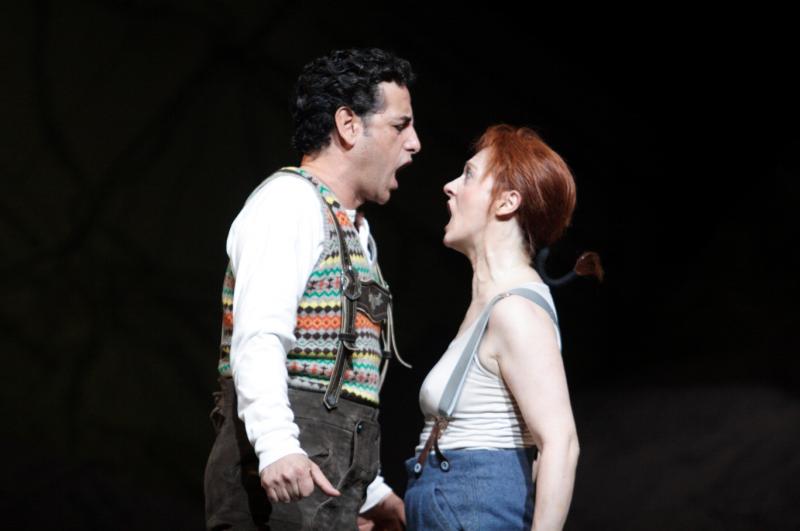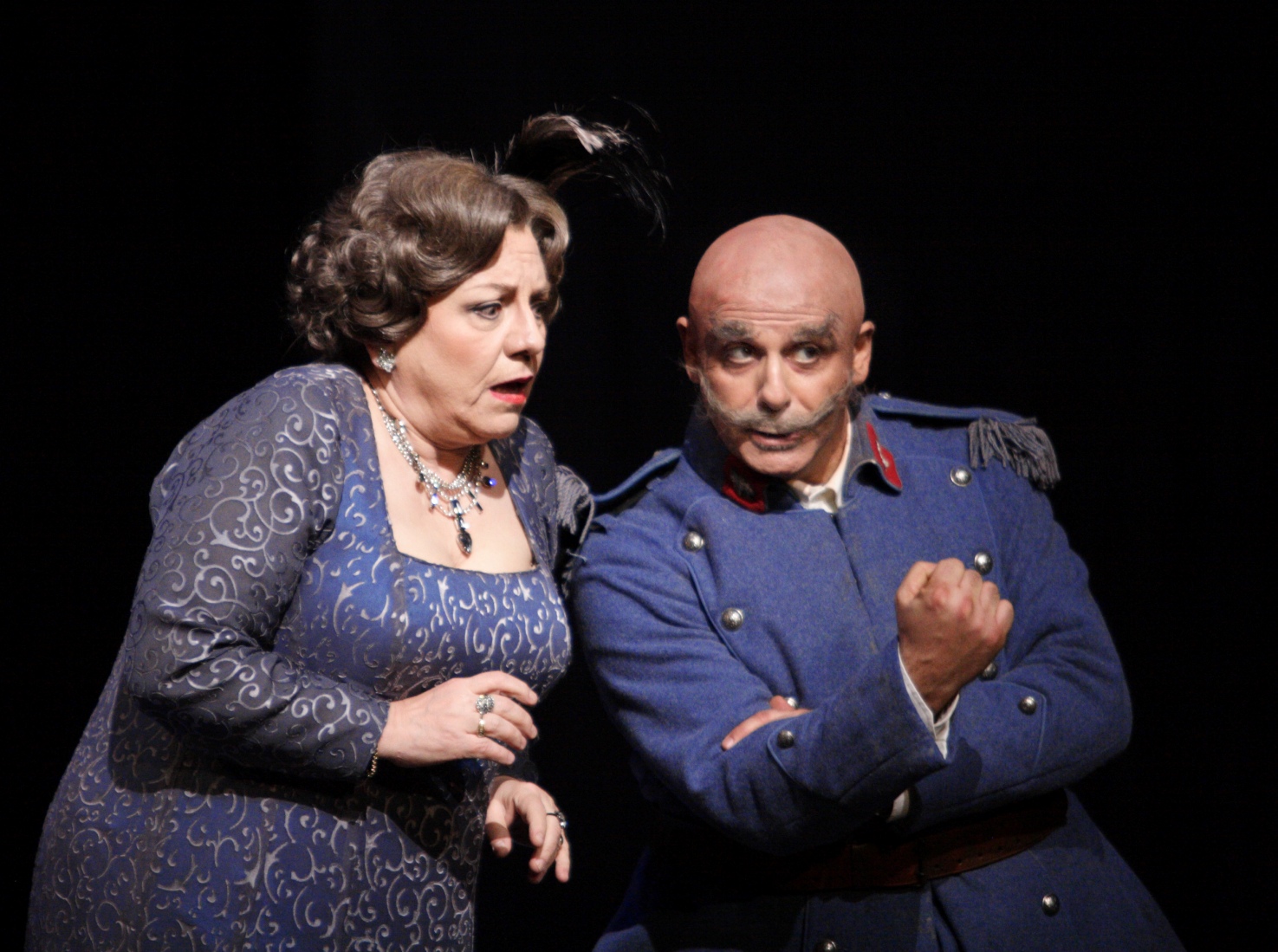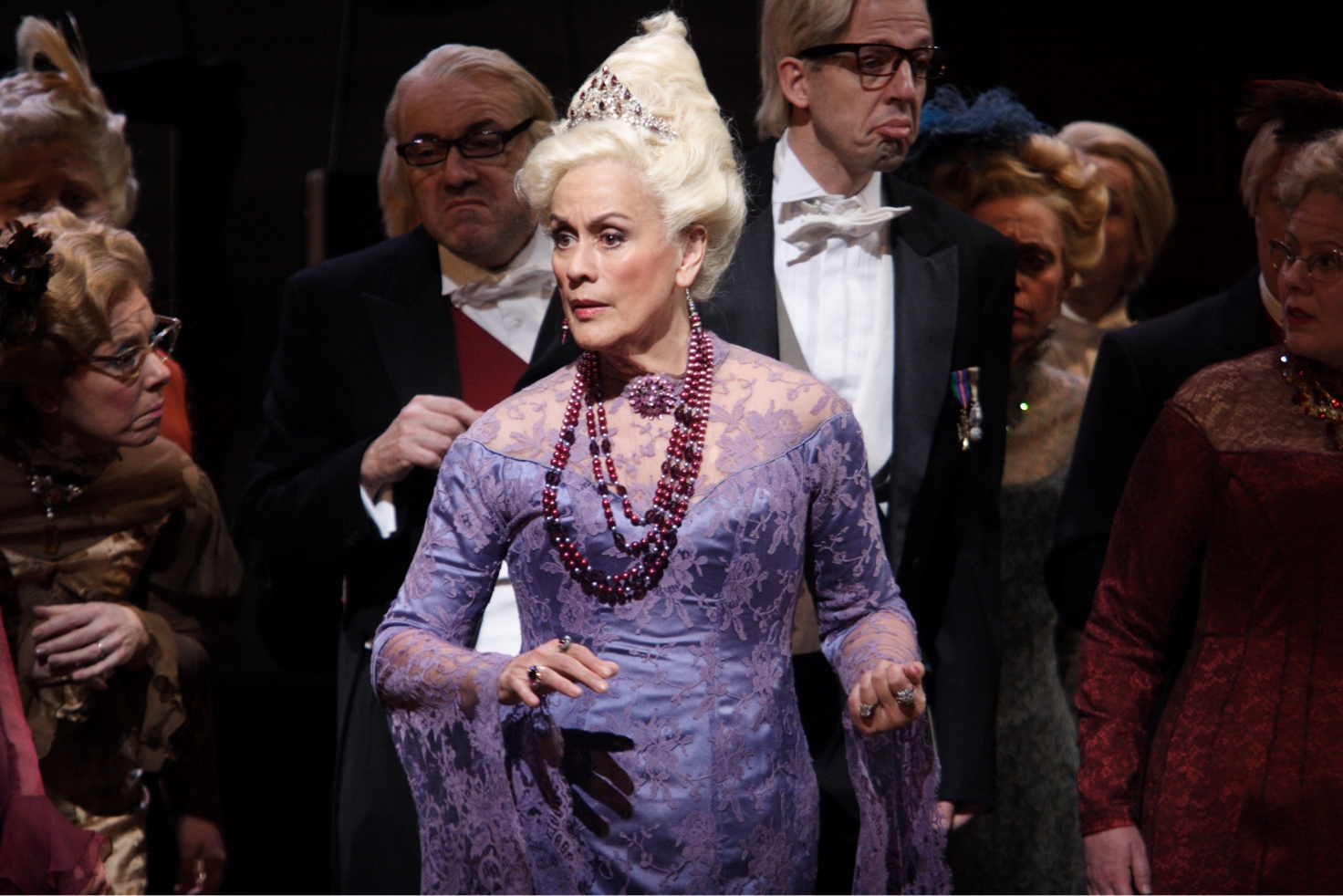La Fille du régiment, Royal Opera | reviews, news & interviews
La Fille du régiment, Royal Opera
La Fille du régiment, Royal Opera
Donizetti's potboiler bubbles at lowish temperatures, but a star tenor still hits the high Cs

Roll up, roll up, to hear Juan Diego Flórez deliver his nine cheek-by-jowl top Cs in the umpteenth performance of Laurent Pelly’s slick, often funny Donizetti comedy. Does the whole thing still fizz? Only up to a point in Christian Räth's revival. Yet I’d still rather see this – or Don Pasquale, or L’elisir d’amore – any number of times than endure any more of the composer’s “unjustly neglected” tinpot tragedies.
Let’s be fair: Covent Garden’s ever-personable Director of Opera Kasper Holten warned us that Patrizia Ciofi was recovering from a virus. And that may have explained the cloudy middle register if not the spread top of her coloratura high jinks as heroine Marie, a French regiment’s tomboy darling but unfortunately for her also the lost daughter of a once-naughty Marquise. It meant, unfortunately, that there was something of a mésalliance with Flórez’s cut-glass, brilliantined tenor, which six years in the role of her Tyrolean lover has done nothing to diminish. She did at least unfurl her arias of pathos in each act with palpable musicality and style, but it wasn’t quite enough for the icing on an ever so slightly stale and wobbly cake.
There’s also the drawback that though Ciofi works overtime on the routine, elle n’a pas [assez] de charme – and charme is what the inimitable creator of the role in this production, Natalie Dessay, had in spades. Flórez gives a brief shot at cute acting as Tonio, the gauche partisan who all too readily deserts his national cause, before stepping to the footlights, looking slightly round-shouldered in his army uniform, to stand and deliver his set pieces. The big number with the Cs, “Pour mon âme”, is infallible and predictably brought the house down; in more sustained legato, the slight bleat intrudes a little.
 There's little variety in his arias discs, and it’s not a voice I find I can listen to for long, but then in La Fille du régiment one doesn’t have to. Around him a male chorus produces variable quality – near-inaudible in the Act One “Rataplan” chorus – and ham acting, not much helped by the am-dram routines, a bit of a surprise from choreographer Laura Scozzi now that I’ve seen her unique take on Rameau’s Les Indes galantes, but then she’s not working with dancers here.
There's little variety in his arias discs, and it’s not a voice I find I can listen to for long, but then in La Fille du régiment one doesn’t have to. Around him a male chorus produces variable quality – near-inaudible in the Act One “Rataplan” chorus – and ham acting, not much helped by the am-dram routines, a bit of a surprise from choreographer Laura Scozzi now that I’ve seen her unique take on Rameau’s Les Indes galantes, but then she’s not working with dancers here.
Pietro Spagnoli produces firm, bright baritone tone as Sergeant Sulpice, Marie’s No. 1 regimental “daddy”, but mugs a bit too much; he, too, is short on charme. Whereas star Polish contralto Ewa Podleś (pictured with Spagnoli above) cuts with the trademark redoubtable chest notes and makes us actually like her snobbish Marquise de Berkenfeld in Act Two (and isn’t that her playing the piano in Marie’s unsuccessful music lesson?) Here she comes into her own as a kind of Miss Mapp to the Queen Lucia of la Duchesse de Krakentorp, arrived to offer the still unhousetrained Marie a “respectable” marriage. And regal she is, because Dawn French, Pelly’s first grande Duchesse, is now Kiri te Kanawa, no less (pictured below).
 Poise she has; breeding, no, because in what I presume is a virtue made out of Kiri’s weird French, La Krakentorp is clearly a Kiwi married in to the European aristocracy. She sings more than a bit, too: namely the arietta “O fior del giorno” from Puccini’s second opera Edgar, an obvious anachronism alongside the Donizetti, but germane to Pelly's pre-WW1 setting. It’s what you might have anticipated from a nearly-70 year old with form (though expect fireworks at Thursday’s birthday performance).
Poise she has; breeding, no, because in what I presume is a virtue made out of Kiri’s weird French, La Krakentorp is clearly a Kiwi married in to the European aristocracy. She sings more than a bit, too: namely the arietta “O fior del giorno” from Puccini’s second opera Edgar, an obvious anachronism alongside the Donizetti, but germane to Pelly's pre-WW1 setting. It’s what you might have anticipated from a nearly-70 year old with form (though expect fireworks at Thursday’s birthday performance).
Yves Abel start well with the orchestral pastoral of the overture, surprisingly high-quality stuff from Donizetti, but doesn’t generate the last degree of bounce or lilt to the tuneful score (it doesn’t help that Marie’s camp song can’t really become a proper waltz the way it’s staged). It’s still fun enough, and Chantal Thomas’s design of hilly campaign maps, giant dropped-in sentimental postcards and a skeletal stately room lends distinctive visual style, though playing up the realism makes the war-in-Europe comedy a tad distasteful under the present circumstances. Total escapism this isn’t, but it does a good operatic comedy proud. Now it’s time for the Royal Opera to give us a luxuriously cast G&S Pirates of Penzance – then we’d have the wit in the words as well as in the music.
rating
Share this article
The future of Arts Journalism
You can stop theartsdesk.com closing!
We urgently need financing to survive. Our fundraising drive has thus far raised £49,000 but we need to reach £100,000 or we will be forced to close. Please contribute here: https://gofund.me/c3f6033d
And if you can forward this information to anyone who might assist, we’d be grateful.

Subscribe to theartsdesk.com
Thank you for continuing to read our work on theartsdesk.com. For unlimited access to every article in its entirety, including our archive of more than 15,000 pieces, we're asking for £5 per month or £40 per year. We feel it's a very good deal, and hope you do too.
To take a subscription now simply click here.
And if you're looking for that extra gift for a friend or family member, why not treat them to a theartsdesk.com gift subscription?
more Opera
 The Railway Children, Glyndebourne review - right train, wrong station
Talent-loaded Mark-Anthony Turnage opera excursion heads down a mistaken track
The Railway Children, Glyndebourne review - right train, wrong station
Talent-loaded Mark-Anthony Turnage opera excursion heads down a mistaken track
 La bohème, Opera North review - still young at 32
Love and separation, ecstasy and heartbreak, in masterfully updated Puccini
La bohème, Opera North review - still young at 32
Love and separation, ecstasy and heartbreak, in masterfully updated Puccini
 Albert Herring, English National Opera review - a great comedy with depths fully realised
Britten’s delight was never made for the Coliseum, but it works on its first outing there
Albert Herring, English National Opera review - a great comedy with depths fully realised
Britten’s delight was never made for the Coliseum, but it works on its first outing there
 Carmen, English National Opera review - not quite dangerous
Hopes for Niamh O’Sullivan only partly fulfilled, though much good singing throughout
Carmen, English National Opera review - not quite dangerous
Hopes for Niamh O’Sullivan only partly fulfilled, though much good singing throughout
 Giustino, Linbury Theatre review - a stylish account of a slight opera
Gods, mortals and monsters do battle in Handel's charming drama
Giustino, Linbury Theatre review - a stylish account of a slight opera
Gods, mortals and monsters do battle in Handel's charming drama
 Susanna, Opera North review - hybrid staging of a Handel oratorio
Dance and signing complement outstanding singing in a story of virtue rewarded
Susanna, Opera North review - hybrid staging of a Handel oratorio
Dance and signing complement outstanding singing in a story of virtue rewarded
 Ariodante, Opéra Garnier, Paris review - a blast of Baroque beauty
A near-perfect night at the opera
Ariodante, Opéra Garnier, Paris review - a blast of Baroque beauty
A near-perfect night at the opera
 Cinderella/La Cenerentola, English National Opera review - the truth behind the tinsel
Appealing performances cut through hyperactive stagecraft
Cinderella/La Cenerentola, English National Opera review - the truth behind the tinsel
Appealing performances cut through hyperactive stagecraft
 Tosca, Royal Opera review - Ailyn Pérez steps in as the most vivid of divas
Jakub Hrůša’s multicoloured Puccini last night found a soprano to match
Tosca, Royal Opera review - Ailyn Pérez steps in as the most vivid of divas
Jakub Hrůša’s multicoloured Puccini last night found a soprano to match
 Tosca, Welsh National Opera review - a great company reduced to brilliance
The old warhorse made special by the basics
Tosca, Welsh National Opera review - a great company reduced to brilliance
The old warhorse made special by the basics
 BBC Proms: The Marriage of Figaro, Glyndebourne Festival review - merriment and menace
Strong Proms transfer for a robust and affecting show
BBC Proms: The Marriage of Figaro, Glyndebourne Festival review - merriment and menace
Strong Proms transfer for a robust and affecting show
 BBC Proms: Suor Angelica, LSO, Pappano review - earthly passion, heavenly grief
A Sister to remember blesses Puccini's convent tragedy
BBC Proms: Suor Angelica, LSO, Pappano review - earthly passion, heavenly grief
A Sister to remember blesses Puccini's convent tragedy

Add comment